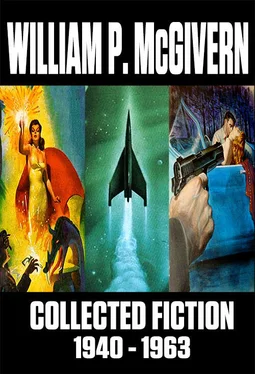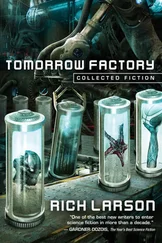Уильям Макгиверн - Collected Fiction - 1940-1963
Здесь есть возможность читать онлайн «Уильям Макгиверн - Collected Fiction - 1940-1963» весь текст электронной книги совершенно бесплатно (целиком полную версию без сокращений). В некоторых случаях можно слушать аудио, скачать через торрент в формате fb2 и присутствует краткое содержание. Год выпуска: 2014, Издательство: Jerry eBooks, Жанр: Ужасы и Мистика, Фантастика и фэнтези, Детектив, Прочие приключения, на английском языке. Описание произведения, (предисловие) а так же отзывы посетителей доступны на портале библиотеки ЛибКат.
- Название:Collected Fiction: 1940-1963
- Автор:
- Издательство:Jerry eBooks
- Жанр:
- Год:2014
- ISBN:нет данных
- Рейтинг книги:3 / 5. Голосов: 1
-
Избранное:Добавить в избранное
- Отзывы:
-
Ваша оценка:
- 60
- 1
- 2
- 3
- 4
- 5
Collected Fiction: 1940-1963: краткое содержание, описание и аннотация
Предлагаем к чтению аннотацию, описание, краткое содержание или предисловие (зависит от того, что написал сам автор книги «Collected Fiction: 1940-1963»). Если вы не нашли необходимую информацию о книге — напишите в комментариях, мы постараемся отыскать её.
Collected Fiction: 1940-1963 — читать онлайн бесплатно полную книгу (весь текст) целиком
Ниже представлен текст книги, разбитый по страницам. Система сохранения места последней прочитанной страницы, позволяет с удобством читать онлайн бесплатно книгу «Collected Fiction: 1940-1963», без необходимости каждый раз заново искать на чём Вы остановились. Поставьте закладку, и сможете в любой момент перейти на страницу, на которой закончили чтение.
Интервал:
Закладка:
Captain Royce was already issuing commands that cracked like pistol shots from O’Leary’s speaker. To unmarked patrols thirty and forty he gave the location and license number of the Ford and ordered them to intercept it, slow it down, keep it out of the convoy. To O’Leary he said, “Pull up beside him. He won’t try anything with you there. When patrols thirty and forty get into position, pull on ahead a few hundred yards. And for heaven’s sake, be careful. We can’t have a wreck, and we can’t have any shooting.”
“Check!” said O’Leary and swung out into the left lane. As he pulled up beside the Ford, he saw the driver hunched forward over the wheel, but the streaming rain made it impossible to single out the details of his features; he had an impression of bulk, the flash of eyeglasses, nothing else. O’Leary slowed down to pace the Ford, which was still edging toward the right side of the middle lane. In the right lane the presidential convoy rolled smoothly down the pike, stately and decorous, with patrol cars at the head and rear of the column. O’Leary noticed that the Ford was swinging back gradually to the center of its lane; the driver had obviously spotted him and was postponing his move. In his rear-vision mirror O’Leary saw a pair of headlights rushing up on him through the rain that slashed vividly through the darkness.
This would be the first of the unmarked patrols. O’Leary moved a car length ahead of the Ford, then another, giving the trooper speeding up behind him room to cut into the middle lane and position his car in front of the killer’s.
Sheila must be lying on the floor of the Ford, O’Leary realized, and the thought was a maddening one; he hated to leave now, but there was no place for impulsive heroics in the business of policing the turnpike. And his years of training and discipline were strong enough to counterbalance any temptation toward individual action. If she was in the car, her best chances of safety lay in police teamwork. If she was in the car — the thought made him feel sick. Hut he knew the killer might have knocked her unconscious, or killed her and thrown her body into the fields alongside the pike. To stop and get rid of her body would have taken only a few seconds, and in that brief time he would run little risk of being spotted by a patrol.
O’Leary stepped on his accelerator and moved ahead of the convoy; in his rear-vision mirror he saw a black station wagon cut smoothly in front of the Ford.
XVI
Harry Bogan cursed at his luck, cursed at the rain driving in thin, silver columns through his headlights. He hunched himself forward and wiped steam from the windshield with the palm of his hand.
A few minutes before he had been laughing with boisterous good humor. The plan was going to work; he had been convinced of it. The intervals between the cars in the convoy were long, and the rain was a fine, steaming cover for the move he had planned to make. He had read in the newspapers of the President’s trip, that he was attending a floodlighted ground-breaking ceremony at a veterans’ hospital in Plankton, near Exit 5, and that he was traveling back to Washington that night.
And then, as Bogan approached Exit 5, he had picked up a broadcast from the local station in Plankton which assured him that his plans to intercept the President’s convoy were timed exactly right. The mayor was being interviewed; he spoke of the honor done the village by the President’s visit, of the inspiring message the President had delivered not only to Plankton but to the nation, to free men everywhere. Bogan had listened intently, irritated by the big words, the round, oratorical voice booming in the car. And then the mayor had said, “Although he has been gone from us only a few short moments, we nevertheless miss him deeply, and our hearts wish him Godspeed on his journey.”
That was what Bogan had needed to know — the time of the President’s departure from Plankton. Until then he had been guessing; now he was certain.
But suddenly, as he was preparing to execute the final step, a police car had come up alongside him and had hung there with maddening persistence. And when it had finally driven on, a fool in a black station wagon was hogging the road in front of him, slowing him down to forty miles an hour and arrogantly ignoring the furious blast of his horn.
The convoy had pulled away from him, the red light of the patrol cars fading into the darkness, and the black station wagon had then swung sedately into the right lane to let Bogan pass. But now another Tool was in the way, a man in a small pickup truck who seemed either drunk or suicidal; he weaved erratically in front of him, frustrating all his attempts to get by.
Bogan no longer felt inflated by the proud sense of accomplishment. Everything had become confusing and pointless; as with the breach with his brother and the long years of bitter and meaningless disappointments, there was no rhyme or reason to what was now happening to him, only the feeling of having been wronged somehow and the need to strike back at his tormentors. But his trail of splintered thoughts had come to a sustaining end. Every hand was raised to destroy him. But they wouldn’t find it so easy.
He called sharply to the girl in the back seat. “You think you’re going to marry your big handsome trooper, don’t you? You think I’ll turn you over to him safe and sound, eh? Pretty and sweet, so he can paw you. Is that what you’re hoping?”
Sheila was lying on her side. In that position she was able to work at the buckle that secured the belt about her ankles. “Where are you taking me?” she said. There was no purpose to her question; she hoped only to distract him from his ugly preoccupation with herself and Dan. She couldn’t bear the thread of obscene excitement in his voice, the frenzy of his insinuations.
“You’ll know where I’m taking you when we get there,” he said.
She had given up hope that her apron would be found. She imagined it wet and crumpled on the highway with thousands of tires grinding it into a soggy, unrecognizable mass. The only chance now was when he stopped to pay his toll at an exit; if it were possible, if he didn’t discover that her hands were free before then, she would claw open the door and throw herself from the car. He would shoot her, of course; she knew that from what he had been saying and the sound of his voice that he intended to kill her one way or another. But she could choose the way; and she knew that a bullet would be infinitely preferable to being alone with him in the anonymous darkness that stretched beyond the turnpike.
Bogan laughed suddenly. The pickup truck had moved out of his way. He hadn’t lost more than a few minutes. The President’s convoy was traveling under the legal limit, probably only a mile or two ahead of him. There was still time to catch up with it. He pushed down on the accelerator.
XVII
At headquarters battle plans were laid. Sergeant Tonelli had marked the turnpike map with a red thumb tack at the killer’s position and a dozen green ones to indicate the patrol cars surrounding him. Captain Royce sucked on his cold pipe and considered the problem to be solved; they would get the killer, of course, but the job was to get him without hurting anyone else. The presidential convoy was now well out of danger. After pulling ahead of the killer’s blocked-off car, the convoy had moved to the left lane and increased its speed to seventy miles an hour, with a patrol car clearing the way with sirens. The convoy was streaking toward the last exit now, and the killer couldn’t possibly catch it; and even if his car were fast enough, there were patrols available to cut him off.
“We might take him right on the pike,” Tonelli suggested. “Box him in; knock him off the road. There’d be guns in his face before he knew what hit him!”
Читать дальшеИнтервал:
Закладка:
Похожие книги на «Collected Fiction: 1940-1963»
Представляем Вашему вниманию похожие книги на «Collected Fiction: 1940-1963» списком для выбора. Мы отобрали схожую по названию и смыслу литературу в надежде предоставить читателям больше вариантов отыскать новые, интересные, ещё непрочитанные произведения.
Обсуждение, отзывы о книге «Collected Fiction: 1940-1963» и просто собственные мнения читателей. Оставьте ваши комментарии, напишите, что Вы думаете о произведении, его смысле или главных героях. Укажите что конкретно понравилось, а что нет, и почему Вы так считаете.

![Уильям Макгиверн - Завтра опять неизвестность [английский и русский параллельные тексты]](/books/35168/uilyam-makgivern-zavtra-opyat-neizvestnost-angli-thumb.webp)









